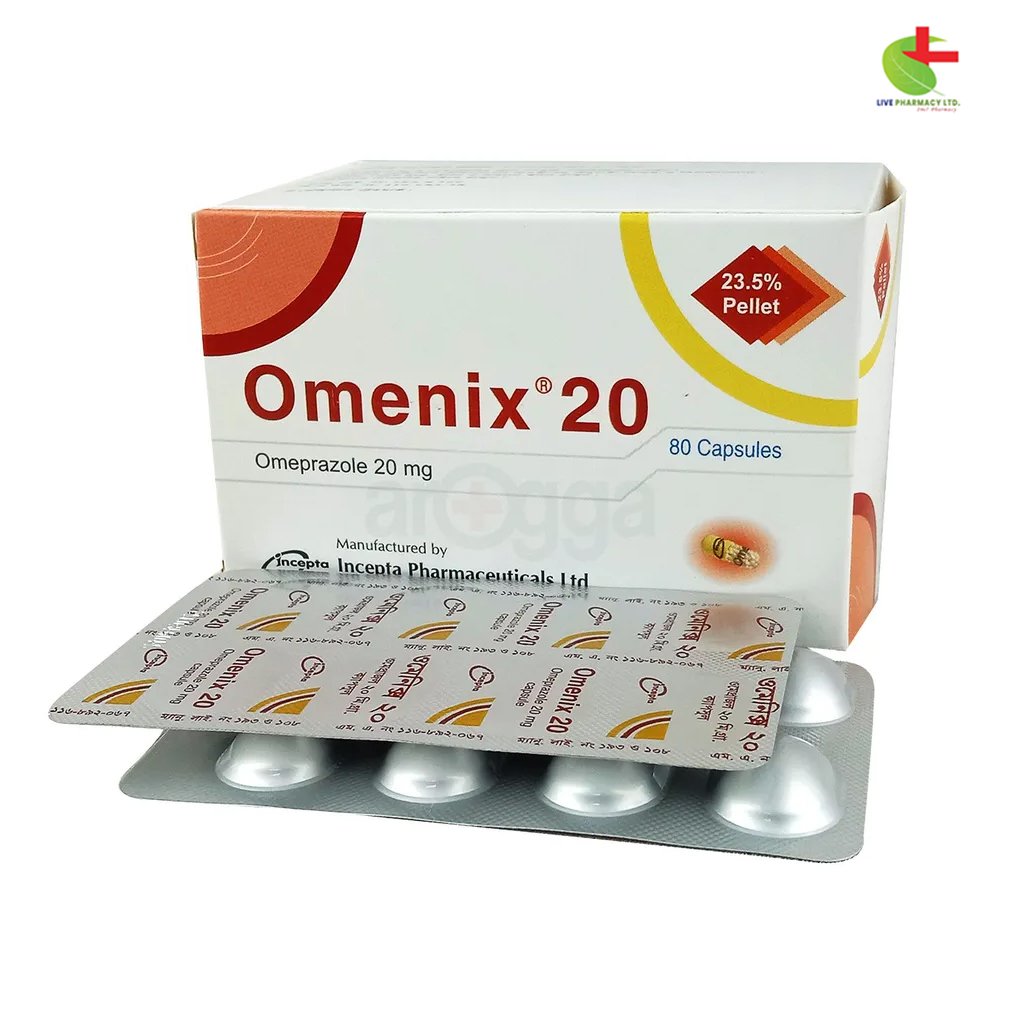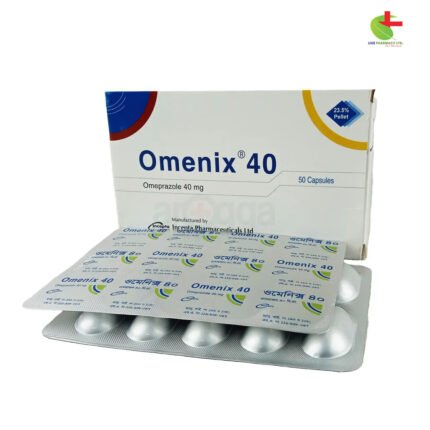Omenix 20
40.00৳ Strip
- Omenix is a proton pump inhibitor containing Omeprazole.
- It effectively treats gastric and duodenal ulcers, gastroesophageal reflux disease (GERD), and NSAID-related ulcers.
- Provides rapid action with long-lasting effects for acid-related conditions.
- Consult a healthcare professional for personalized dosing and safety information.
 Brand
Brand
|
Incepta Pharmaceuticals Ltd |
|---|---|
 Generics
Generics
|
Omeprazole |
 Type
Type
|
Capsule |
Indications
Omenix is prescribed for the treatment of:
- Gastric and duodenal ulcers
- NSAID-related duodenal and gastric ulcers
- Prophylaxis in patients with a history of NSAID-related ulcers
- Gastroesophageal reflux disease (GERD)
- Long-term management of acid reflux
- Acid-related dyspepsia
- Severe ulcerating reflux esophagitis
- Prophylaxis against acid aspiration during general anesthesia
- Zollinger-Ellison syndrome
- Helicobacter pylori-induced peptic ulcers
Pharmacology
Omenix contains Omeprazole, a benzimidazole derivative that effectively inhibits gastric acid secretion. It functions by blocking the hydrogen-potassium-adenosine triphosphatase (H+/K+ ATPase) enzyme system in gastric parietal cells. After oral administration, the antisecretory effect begins within one hour, peaks at two hours, and can last up to 72 hours. Once discontinued, normal secretory activity gradually resumes over 3 to 5 days.
Dosage
Oral Administration:
- Benign gastric and duodenal ulcers: 20 mg once daily for 4 weeks for duodenal ulcers and 8 weeks for gastric ulcers. In severe cases, increase to 40 mg daily. Maintenance for recurrent duodenal ulcers is 20 mg daily; for relapse prevention, 10-20 mg daily.
- NSAID-related ulcers: 20 mg daily for 4 weeks; may continue for an additional 4 weeks if not fully healed. For prophylaxis, use 20 mg once daily.
- Gastroesophageal reflux disease: 20 mg once daily for 4 weeks; if not fully healed, continue for an additional 4-8 weeks. A dose of 40 mg once daily may be given for 8 weeks if resistant to other treatments; maintenance is 20 mg once daily.
- Long-term acid reflux management: 10-20 mg daily.
- Acid-related dyspepsia: 10-20 mg daily for 2-4 weeks.
- Prophylaxis of acid aspiration: 40 mg the evening before surgery, then 40 mg 2-6 hours prior.
- Zollinger-Ellison syndrome: Start with 60 mg daily; usual range is 20-120 mg daily (doses above 80 mg should be split into two doses).
- Helicobacter pylori eradication: 20 mg twice daily with antibiotics such as Amoxicillin and Metronidazole or Clarithromycin for one week.
- Pediatric use in severe reflux esophagitis (children over 1 year):
- 10-20 kg: 10-20 mg daily for 4-12 weeks.
- Over 20 kg: 20-40 mg daily for 4-12 weeks.
IV Injection:
- Prophylaxis of acid aspiration: 40 mg IV, administered slowly over 5 minutes one hour before surgery.
- Duodenal or gastric ulcer, reflux esophagitis: 40 mg IV once daily when oral administration is inappropriate.
- Zollinger-Ellison syndrome: Initial dose of 60 mg IV daily, adjusting higher as needed, with doses over 60 mg split into two doses.
Always consult a registered healthcare professional before use.
Administration
IV Injection: Omeprazole should only be given intravenously. For IV injection, dissolve the lyophilized powder in 10 ml of water for injection and administer slowly over 2 to 5 minutes at a maximum rate of 4 ml/minute. Use the solution within 4 hours of preparation.
IV Infusion: For IV infusion, dissolve the contents of one vial in 100 ml of saline or 5% dextrose. Administer over 20-30 minutes or more. Use within 12 hours (saline) or 6 hours (5% dextrose) after preparation. Do not mix with other medications in the same infusion set.
Always consult a registered healthcare professional before use.
Interaction
Omeprazole can reduce the absorption of ketoconazole due to decreased intragastric acidity. As it is metabolized in the liver via cytochrome P450, it may affect the elimination of diazepam, phenytoin, and warfarin. Monitoring of these medications is recommended, and dosage adjustments may be necessary. Co-administration of Omeprazole with clarithromycin can increase plasma concentrations, beneficial for H. pylori eradication. There are no significant interactions with phenacetin, theophylline, or other listed medications. Alcohol and food do not affect Omeprazole absorption.
Contraindications
Omeprazole is contraindicated for patients with known hypersensitivity to the drug. If a gastric ulcer is suspected, malignancy should be ruled out before starting treatment, as symptoms may improve and delay diagnosis.
Side Effects
Omenix is generally well-tolerated, with mild and reversible adverse effects. Common side effects include skin rash, urticaria, and pruritus. Severe gastrointestinal reactions may include diarrhea and headache, which resolve upon discontinuation. Other reported side effects include dizziness, insomnia, and, in rare cases, severe reactions such as anaphylactic shock and liver enzyme elevations.
Pregnancy & Lactation
Studies indicate that Omeprazole does not adversely affect pregnancy or fetal health. It can be used during pregnancy; however, breastfeeding should be avoided if the drug is deemed essential, as its effects on neonates are unknown.
Precautions & Warnings
Avoid using Omeprazole with clopidogrel as it may reduce its effectiveness. Long-term use may be associated with an increased risk of osteoporosis-related fractures. Atrophic gastritis has been noted in long-term users. Caution is advised when using with methotrexate due to potential toxicities.
Therapeutic Class
Proton Pump Inhibitor
Storage Conditions
Store in a dry place, away from light and heat, and out of reach of children.













Reviews
There are no reviews yet.